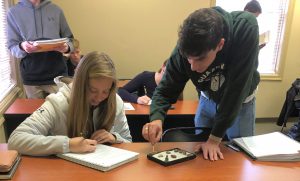GREENEVILLE – A new course at Tusculum University is helping students understand the multitude of faith traditions in the United States and preparing them to interact successfully with those who might have different beliefs.

Tusculum University students Hanna Johnson, left, and Carter DelSorbo look at a Buddhism meditation garden during their class earlier in the spring semester.
Taught by Dr. Ronda Gentry, assistant professor of religious studies, an honors seminar called Interfaith is a multi-faceted course that enables students to replace fear of something different or unknown with knowledge. It also enables them to respect others’ beliefs so they can conduct business or speak with a person without letting different viewpoints interfere.
“Students do not have to change their own belief system when they take steps to learn more about the faiths of others,” said Dr. Gentry, a Baptist minister. “We challenge students on their perceptions and teach them how their biases and false impressions of religious beliefs can affect their professional lives. Through this course, our students will be well prepared to start and build successful connections with someone even if they hold different philosophies.”
The class, which initially met in person before moving online as a result of the coronavirus, uses the book “Out of Many Faiths: Religious Diversity and the American Promise” by Eboo Patel as its guide. Patel founded Interfaith Youth Core, a national nonprofit organization, on the concept religion should be a bridge of cooperation instead of a barrier.
One of the more interesting days in class occurred when Dr. Gentry brought in signs and symbols of various faiths, such as a Catholic rosary, a Jewish menorah, a Protestant cross, a Buddhism meditation garden and an Islamic prayer rug. Dr. Gentry asked students to write how each of these symbols made them feel as a starting point toward helping them learn the importance of those items to those who practice that faith.
Another part of the class teaches about the demeaning ways some faiths are portrayed in the political arena. Dr. Gentry said the class discusses how that discourse is unhealthy and destructive.
One of Dr. Gentry’s assignments for students was to watch a video of “The Interfaith Amigos.” This group includes a minister from the United Church of Christ, a Jewish rabbi and a Muslim imam who use humor to help people appreciate the promise and problems of the interfaith experience and openly discuss the taboo subjects in dialogue between faiths. They emphasize how having an interfaith mindset has made them better leaders.
Hanna Johnson, a junior majoring in political science, said she was inspired to take the class because she likes how Dr. Gentry initiates discussions in her courses about topics that are sometimes uncomfortable.
“This class has helped me better understand other faith traditions as well as society through simple exposure to their beliefs,” Johnson said. “It has brought up the idea that if religions could work together and coordinate, the world would be a much better place. Religious people could all come together and focus on concerns everyone has, such as social issues or environmental problems.”
Johnson believes every student should take a class about interfaith understanding.
“It not only teaches critical thinking skills but also directly confronts stereotypes society has placed on all religions,” she said. “This class highlights that fear should not be a factor. As a citizen, I think I need to be able to have hard conversations that cross bridges and build relationships in order to foster civic engagement. This class has taught us how to do that.”
Tusculum received a $4,000 grant from Interfaith Youth Core to fund components of the class, such as the signs and symbols of faiths and curriculum development. Dr. Scott Hummel, Tusculum’s president, said he is grateful for the grant and the thoughtful discussion it has produced.
“As a university that provides a comprehensive education in a Judeo-Christian environment, Tusculum welcomes people of all faiths,” Dr. Hummel said. “We encourage people to explore their own beliefs in greater depth and to expand their horizons by learning more about other traditions. Universities serve a valuable function when they are a catalyst for dialogue, and our students will benefit greatly in the long run on all fronts from their participation in this class.”


